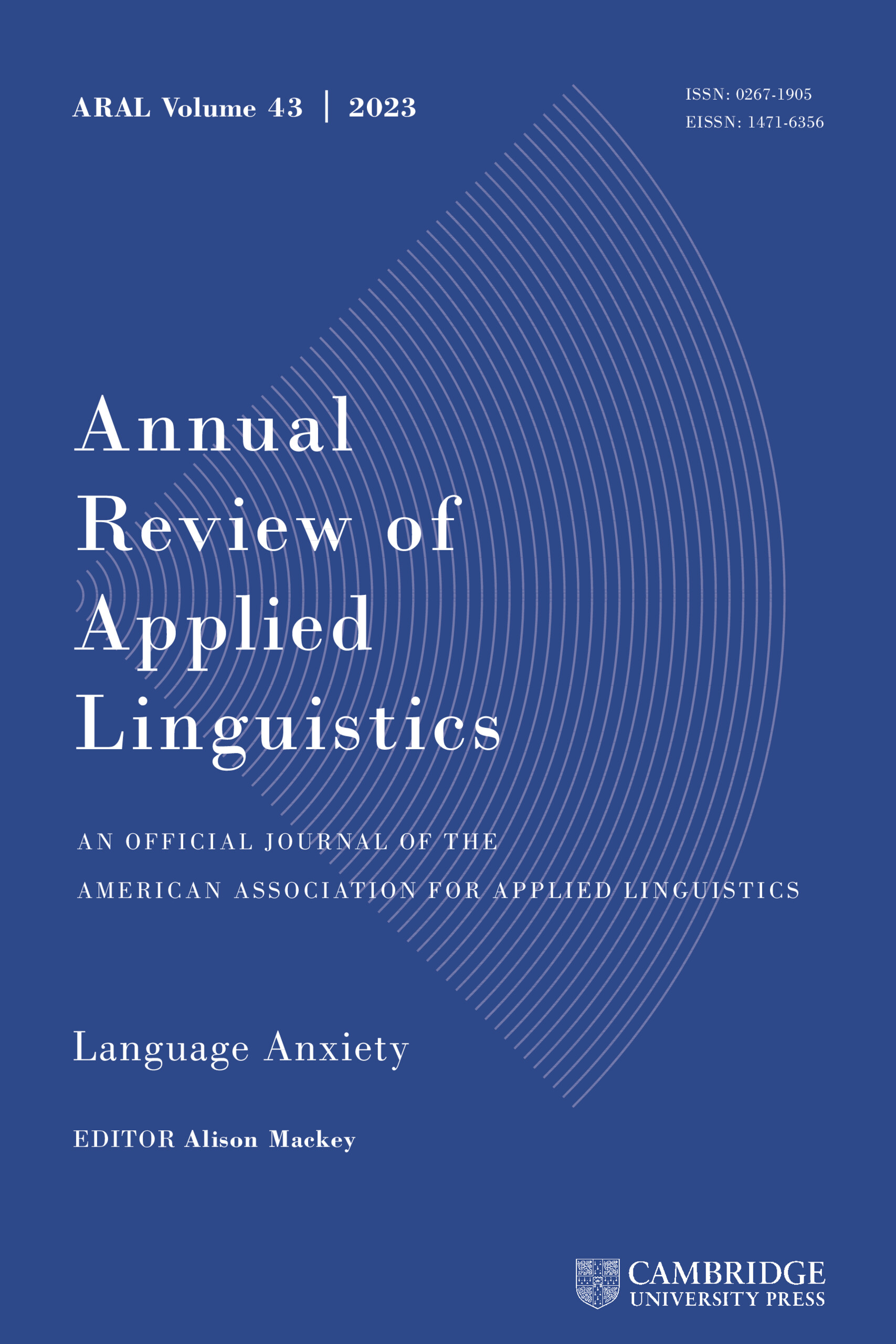Crossref Citations
This article has been cited by the following publications. This list is generated based on data provided by
Crossref.
Motha, Suhanthie
2020.
Applied Linguistics and Language Teaching in the Neo-Nationalist Era.
p.
295.
Kubota, Ryuko
2021.
Antiracism for East Asian students and professionals in TESOL: A response.
TESOL Journal,
Vol. 12,
Issue. 3,
Leonard, Wesley Y.
2021.
Toward an Anti‐Racist Linguistic Anthropology: An Indigenous Response to White Supremacy.
Journal of Linguistic Anthropology,
Vol. 31,
Issue. 2,
p.
218.
Wernicke, Meike
2021.
Four ‘moments’ of intercultural encountering.
Teaching in Higher Education,
Vol. 26,
Issue. 7-8,
p.
1130.
Avineri, Netta
and
Martinez, Danny C
2021.
Applied Linguists Cultivating Relationships for Justice: An Aspirational Call to Action.
Applied Linguistics,
Vol. 42,
Issue. 6,
p.
1043.
Jain, Rashi
2022.
Translingual‐identity‐as‐pedagogy: Problematizing monolingually oriented “native‐nonnative” identity constructions through critical dialogues in EAP classrooms.
TESOL Journal,
Vol. 13,
Issue. 3,
Beckett, Gulbahar H.
2022.
Revitalization and revival of indigenous languages and cultures with applied linguistics and technology.
Diaspora, Indigenous, and Minority Education,
Vol. 16,
Issue. 4,
p.
220.
López-Gopar, Mario E.
Sughrua, William M.
Cordova, Vilma Huerta
González, Amairani Jatziri Ríos
and
Vera, Gerardo Regalado
2022.
Mexican student-teachers’ “English” language praxicum: Decolonizing attempts.
International Journal of Educational Research,
Vol. 115,
Issue. ,
p.
102022.
Mackey, Alison
Fell, Erin
de Jesus, Felipe
Hall, Amber
and
Ku, Yunjung (Yunie)
2022.
Social justice in applied linguistics: Making space for new approaches and new voices.
Annual Review of Applied Linguistics,
Vol. 42,
Issue. ,
p.
1.
Kubota, Ryuko
2022.
Decolonizing second language writing: Possibilities and challenges.
Journal of Second Language Writing,
Vol. 58,
Issue. ,
p.
100946.
Pennycook, Alastair
2022.
Critical applied linguistics in the 2020s.
Critical Inquiry in Language Studies,
Vol. 19,
Issue. 1,
p.
1.
Detwyler, Dmitri
2022.
Locating Language-Teacher Identities in the Settler-Colonial Universe.
The Canadian Modern Language Review,
Vol. 78,
Issue. 4,
p.
363.
Sánchez-Martín, Cristina
2022.
Review Essay: “The Power of Many” (Counter)stories: Materializing Spaces of Belonging for (Im)migrants in Rhetoric and Composition.
College English
,
Vol. 85,
Issue. 2,
p.
167.
Phyak, Prem
2022.
Decolonizing translanguaging research methodologies: A commentary and self-reflection.
Research Methods in Applied Linguistics,
Vol. 1,
Issue. 3,
p.
100032.
Peercy, Megan Madigan
and
Sharkey, Judy
2022.
Self-Studies in Urban Teacher Education.
Vol. 25,
Issue. ,
p.
95.
Chang-Bacon, Chris K.
2022.
“We Sort of Dance Around the Race Thing”: Race-Evasiveness in Teacher Education.
Journal of Teacher Education,
Vol. 73,
Issue. 1,
p.
8.
Sugiharto, Setiono
2022.
Antiracist Applied Linguistics, Marxian utopian, and Infra Politics.
JOALL (Journal of Applied Linguistics and Literature),
Vol. 7,
Issue. 2,
p.
311.
Sadeghi, Karim
2022.
Talking About Second Language Acquisition.
p.
39.
2022.
Editorial.
Language, Culture and Society,
Vol. 4,
Issue. 1,
p.
1.
Frieson, Brittany L.
2022.
“It's like they don't see us at all”: A Critical Race Theory critique of dual language bilingual education for Black children.
Annual Review of Applied Linguistics,
Vol. 42,
Issue. ,
p.
47.





